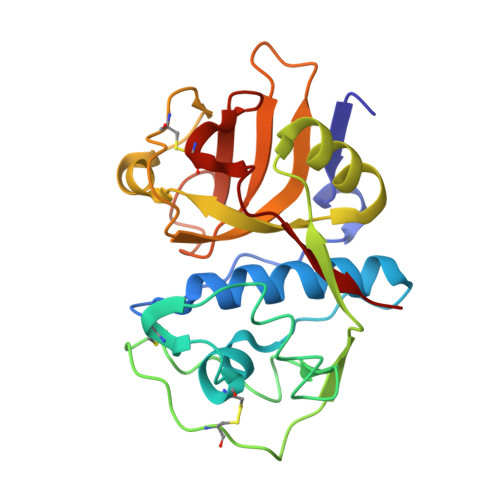A target within the target: probing cruzain's P1' site to define structural determinants for the Chagas' disease protease.
Brinen, L.S., Hansell, E., Cheng, J., Roush, W.R., McKerrow, J.H., Fletterick, R.J.(2000) Structure 8: 831-840
- PubMed: 10997902
- DOI: https://doi.org/10.1016/s0969-2126(00)00173-8
- Primary Citation of Related Structures:
1F29, 1F2A, 1F2B, 1F2C - PubMed Abstract:
Cysteine proteases of the papain superfamily are present in nearly all groups of eukaryotes and play vital roles in a wide range of biological processes and diseases, including antigen and hormone processing, bacterial infection, arthritis, osteoporosis, Alzheimer's disease and cancer-cell invasion. Because they are critical to the life-cycle progression of many pathogenic protozoa, they represent potential targets for selective inhibitors. Chagas' disease, the leading cause of death due to heart disease in Latin American countries, is transmitted by Trypanosoma cruzi. Cruzain is the major cysteine protease of T cruzi and has been the target of extensive structure-based drug design. High-resolution crystal structures of cruzain bound to a series of potent phenyl-containing vinyl-sulfone, sulfonate and sulfonamide inhibitors have been determined. The structures show a consistent mode of interaction for this family of inhibitors based on a covalent Michael addition formed at the enzyme's active-site cysteine, hydrophobic interactions in the S2 substrate-binding pocket and a strong constellation of hydrogen bonding in the S1' region. The series of vinyl-sulfone-based inhibitors examined in complex with cruzain was designed to probe recognition and binding potential of an aromatic-rich region of the enzyme. Analysis of the interactions formed shows that aromatic interactions play a less significant role, whereas the strength and importance of hydrogen bonding in the conformation adopted by the inhibitor upon binding to the enzyme was highlighted. A derivative of one inhibitor examined is currently under development as a therapeutic agent against Chagas' disease.
- Department of Pathology, University of California, San Francisco 94143, USA. brinen@msg.ucsf.edu
Organizational Affiliation:

















